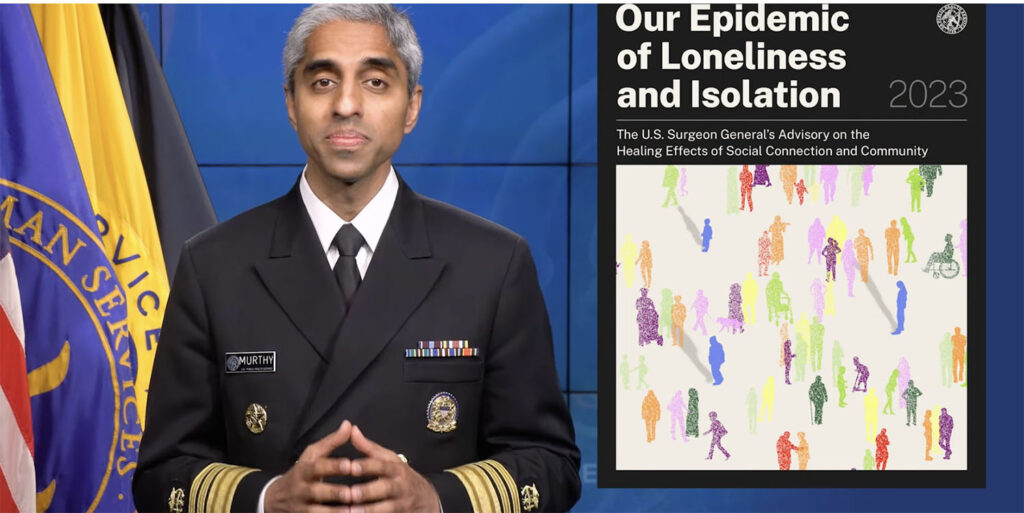By Olivia Salzwedel, Alliance Intern from University of Minnesota Morris ’22
More than 60% of Americans are experiencing serious loneliness, according to PBS. The loneliness epidemic in the US has such severe health consequences that the crisis is comparable to smoking up to 15 cigarettes a day, according to a PLOS study. As US Surgeon General Dr. Vivek Murthyi points out, it’s also linked to increases in anxiety and depression, heart disease (29%), dementia (50%) and stroke (32%). It’s exacerbated by Covid isolation, social media, news outlets and toxic workspaces.
On the other hand, the positive news is that a 2021 survey found that “two-thirds of respondents said they cared for all Americans regardless of their political views, and a similar percent preferred to live in politically diverse neighborhoods.” A majority of the country has the desire to connect with their community but they need help from leaders to take the first steps of change, according to US Sen. Chris Murphy in his piece for TIME. Of course, each of us can also be a leader bringing change.
American individualism vs the common good
A major challenge we face is that America was founded on individualism with the “American Dream” but this concept has been taken too far, as it is now a normalized concept for people to step over their peers to get ahead. These self-aggrandizing but successful at-all-cost individuals were seen as outliers but they have now become idolized icons of American greatness.
This normalized trend is unacceptable because “our country’s survival may rest on our ability to restore the prior balance between individualism and the common good,” according to US Sen. Murphy in TIME.
This trend has been exacerbated as large news outlets are taking over small independent papers and spreading misinformation, causing people to distrust one another. Companies are not justly paying or placing value in their workers, and the competition and judgment related to social media has turned the US even more individualistic. A Habitats of Heart study identified “that Americans’ have a first language of personal ambitions and only a second language of commitments to others.”
Rebuilding social connnection and circles of care and obligation
The country needs to tackle this problem by both restoring communities at local levels and expanding Americans’ circles of care and obligation, according to US Sen. Chris Murphy. He further emphasizes that government needs to advocate and prioritize its people instead of political gain. This can be done by guiding policy toward limiting technology and both acknowledging and managing the harm social media causes the community, specifically minors.
In addition, US Surgeon General Dr. Vivek Murthy has proposed a national framework to rebuild social connection and community in America. In his 2-minute video discussing loneliness in America he says, “Social connection is as fundamental to our mental and physical health as food, water and sleep.” The framework shows:
- “Social connection significantly improves the health and well-being of all individuals” and “can even impact educational and economic achievement”
- “Social connection is vital to community health and success,” as well as “greater economic prosperity and reduced levels of crime and violence”
- “Fostering social connection requires that we each commit to our relationships and communities. Our actions today can create sustainable changes to society and bring better health to all.”
“Social Connection Fact Cards” are also given that provide the findings of various studies.
Our individual actions can help alleviate loneliness
We can also take cues from other countries and address the challenge of loneliness in our healthcare system. For example, healthcare workers can ask patients about their loneliness level and provide “social prescriptions.” They can then provide resources for patients to gain more meaningful social interaction with places such as public libraries, non-profits and book clubs.
We all can have a role in prioritizing the creation and maintenance of community-based organizations, such as, social clubs, places of worship, and local newspapers to provide places to make genuine connections. And of course, each of us can individually reach out to people we know and do simple things like participating in volunteer community activities, visiting the elderly, helping others with chores and doing random and planned acts of kindness.
We want to thank leaders like US Sen. Murphy and US Surgeon General Vivek Murthy for their leadership in speaking up about this issue.
Clearly, there are both big and personal solutions to end the epidemic of loneliness.

